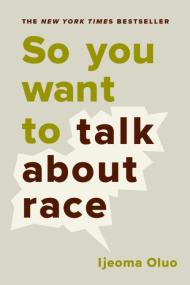Welcome to the Women for Women International Book Club! Readers on Instagram voted on a book for us to read together this July, and you picked So You Want to Talk About Race by Ijeoma Oluo.
When it comes to injustice, we cannot stay silent. Women for Women International believes that Black Lives Matter. We are each called to become better allies and advocates for all women and marginalized people.
Working towards equality of women everywhere means supporting one another to not only overcome systemic barriers but to recognize and dismantle them. Oluo offers a guide to recognizing how barriers may be different for people of color and how to learn from and participate in complex—and often uncomfortable—discussions about race.
What is So You Want to Talk About Race about?
So You Want to Talk About Race helps people have conversations that deepen understanding of race and racial oppression and encourages them to actively dismantle systems built on holding people back.
Oluo walks readers through concepts such as power, privilege, intersectionality, cultural appropriation, microaggressions, tone policing, and more to provide a starting point for productive conversations.
Racism and racial oppression are more than just individual acts of oppression: They’re a system that blocks people of color from opportunities – educational, economic, social, and more—and progress that would allow everyone to live to their full potential. And it’s a system that not only keeps Black people and many people of color down but is hostile and deadly towards them.
As the book addresses issues of police brutality, affirmative action, the school-to-prison pipeline, and White supremacy, it acknowledges the discomfort that comes from recognizing one’s role within racist systems. It encourages people to embrace that discomfort and interrogate it to move the conversation and humanity forward.
Discussion Questions
Author Ijeoma Oluo developed a series of discussion questions to accompany So You Want To Talk About Race. Please use the author’s questions as a guide for your book club discussion and reflection.
Connect with readers on Instagram to share your reactions, thoughts and questions by using the hashtag #WFWIBookClub, and tagging us with @womenforwomen. We want to hear what you think—share with us your take on the book and answers to the questions it raises!
- In Chapter 1, "Is it really about race?," the author states: "It is about race if a person of color thinks it is about race. It is about race if it disproportionately or differently affects people of color. It is about race if it fits into a broader pattern of events that disproportionately or differently affect people of color." After reading the author's explanation of these points, can you think of social or political issues that many people currently believe are not about race, but actually may be? Which of the above guidelines for understanding when it is about race fit those issues?
- The chapter about privilege is placed right before the chapter on intersectionality. The author has stated in interviews that she placed those chapters in that order because it is impossible to fully understand intersectionality without first comprehending privilege. How do the concepts discussed in the chapter "Why am I always being told to check my privilege?" help deepen your understanding of intersectionality and help implement intersectionality into your life?
- The author states that she grew up in a majority white, liberal area and was raised by a white mother. How might that upbringing have influenced the way that she wrote this book? How might it have influenced the personal events she describes in the book? How might this book have been different if written by a black person with a different upbringing, or if written by a person of color of a different race?
- Throughout the book, the author makes it clear that this book is written for both white people and people of color. But does the author expect white people and people of color to read and experience this book in the same way? What are some of the ways in which the author indicates how she expects white people and people of color to react and interact with portions of the book? What are some of the ways in which the author discusses the different roles that white people and people of color will play in fighting systemic racism in our society?
- In Chapter 12, "What are microaggressions?," the author lists some of the racial microaggressions that her friends of color said that they often hear. What are some of the racial microaggressions that you have encountered or witnessed? What are some that you may have perpetrated on others?
- Chapter 15, "But what if I hate Al Sharpton?," discusses the issue of respectability politics and tone policing. What burdens of "respectability" and "tone" do you see placed on different populations of color in our society?
- The final chapter, "Talking is great, but what else can I do?," discusses some actions you can take to battle systemic racism using the knowledge you've gained from this book and from your conversations on race. What are some actions you can take in your community, your schools, your workplace, and your local government? What are some local antiracism efforts in your community that you can join or support?
All of the above questions come from the published reading group guide of So You Want To Talk About Race.

